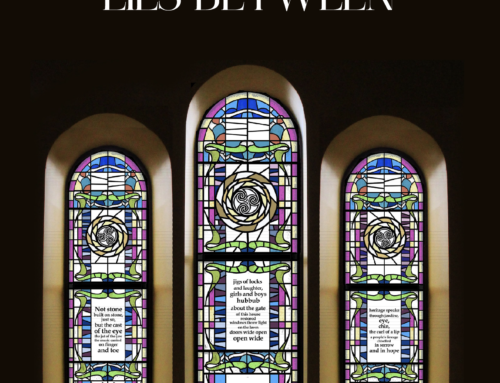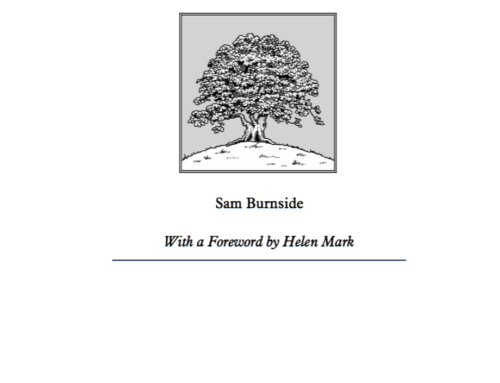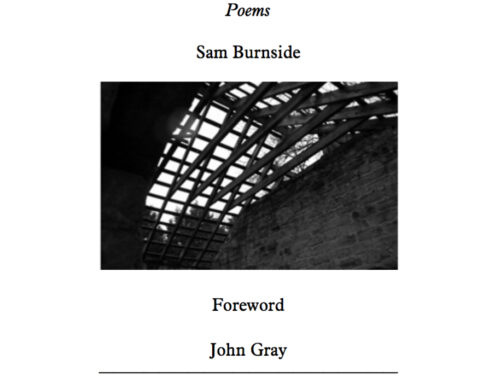Project Description
‘Christmas at the Sunrise Bar’
This is part of a collection of short stories that won the McCrae Literary Award. Other stories have been broadcast and have appeared in New Irish Writing and The Blackstaff Book of Short Stories.
1980
She was black-haired, big-jawed, big-bottomed and plain as a pint of porter. Every day at knocking-off time she’d leave the red-brick inhospitality of the shirt factory and make her way home. Sometimes, when the feeling was on her, she’d take the long way: down to where the bridge ended, and out along the Letterkenny Road, just to walk beside and look at the river. They said the Foyle took three lives every year, and by the smell of it, she sometimes thought, feeling vicious and trapped by all that was around her, by the smell of it you’d think it took three hundred and kept them. Between the river and the road lay bits of waste ground, a rubbish dump of twisted, rusting iron and old brown bottles tangled in the sour grass riverside: a chaos of futility, reaching down damply to the broad sweep of the water. But the river and its troubled bank soothed her, and she liked the walk: the swing of her stride eased her mind until she reached Leckey Road where she’d turn up the hill towards the Bog. There she’d pass through a crumbling greyness with here and there a spot of absurd colour, white enamel on blue tin attached to crooked walls, painted evidence of someone’s dream for the place: Bluebell Gardens, Southend Park, Deanery Street and Dove Gardens. So, she would pass them by and climb to the Lone Moor and then up Creggan Road to her house.
She lived with her mother, worked in the shirt factory, and went on Saturday nights to the Sunrise Bar where she’s sing with her neighbours and get merry and try to forget about Fridays and Mondays. She would sit at a crowded table and laugh and joke and sip slowly until, halfway through her evening, he would sneak out to the ladies.
Outside the room, at the end of the corridor, was a hatch set into the wall. Here she would knock and wait until the barman came: she’d ask him for two double whiskeys, “a Scotch and an Irish,” she’d add, hoping he would think she was buying someone else a drink. Nowadays she did this often, discretely slipping ahead of the rest of the old ones.
On her very last night in the place she followed her usual pattern. When the barman had brought her the drinks and had slammed shut the wooden hatch she quickly poured one glass into the other and dropped the empty one into her bag. She cupped the full glass inside her hand and wrist, hiding it expertly against the folds of her dress, and walked quickly to the toilets. Inside she locked the door and sat dumbly drinking the straight spirits. When she had finished she dumped the two glasses in a bin and returned to her table.
The noise in the room waved over her. It was Christmas Eve and they were painfully happy: a man squeezed and dragged at an accordian and someone was singing “The Town I Loved So Well” in a voice choked with emotion and cracking with the unaccustomed strain. She was at peace now. Her body was heavy and unfelt. It belonged to all that noise outside; to the nasal Derry voices, to the sound of glasses, to the eternally bad, sad, music. Her limbs were distant and beautifully untroublesome. But her mind was free: now she could think thoughts that were sharp and clear: she conversed with herself in a dialogue that ran smoothly and so precisely. She thought of all the old women: why did they always come to her to confide their troubles, to weep their passing years? You’d think she was some bloody nun, receiving their little tittle-tattle confessions. Maybe it was because she was single, maybe they wanted to make her like them: maybe they envied her something, but what? Earlier an old woman had cried on her shoulder, drunken tears running eye-shadow all over the new white dress she’d saved for Christmas, staining it with streaks of black. Why did they hate being married? She smiled. She would like nothing better than a whole drove of weans: all the noise and dirt would be easy. She’d wash them every day, every night, in the heat of the fire, in smell warm water, soapy and smelly and warm, and she’d hold them then and hug them, and them all wet. And she would love them, she would love them; her face crumpled: she pulled herself tightly together and smiled stiffly, falsely, into the smoke and took another drink.
She was startled by a voice, “Keep us a dance, Aggie.” An old man, red-faced, wet-faced, called out to her as he passed the table. She saluted him in response, the casual formality a customised friendliness. Soon the music would change, change to a slow and maudlin warmth as the evening drew to a close; then the old men would come to her and dance. She was a great favourite with them all. With Aggie it was always a friendly word, a bit of a laugh. They’d come, straight-backed with beer, seeking her out at the close of their old-age-paid-for dream, they’d come to dance dances that were young years ago, to shuffle in the space between the tables, squeezing her tight, and occasionally, if they’d been bought a whiskey or two, an old hand would drop low on her back and old remembering fingers would slither along the curve of her backside. And the old lifeless body would press closer. And oh, she’d laugh and hide her stiffness and say, “You’ll be making the wife jealous,” and he’d cringe away. When she had danced in dark dance halls the young men of her youth had not cringed away: they had pulled her close with their strength, with the vigour and hope of youth, and she had flown with them then, round and endlessly round.
Maybe if she’d been easier goin’… But, no, her mother had seen to that. Only once had she gone to the bushes at the bottom of Brooke Park and there she’d finished up with a split lip, and the language, the terrible bad language he’d used. All the other girls had got men and homes and families out of going to the bushes, and she had got nothing but a split lip.
She fumbled for a cigarette and then for a match. She stretched across the table for a box and sent a glass spinning to the floor. Someone shouted “Quiet!” As the glass splintered on the hard floor: her matches lay beyond reach: no one noticed, no one bothered to help her. A voice was singing “Danny Boy”, and she sat in the hushed room, the cigarette dangling from her mouth. Why didn’t some man light her cigarette? Why did they never see her except when they wanted something for themselves.
She started to cry then, and got up and left the room, left the pub and walked up Creggan Road, her numb hand brushing the rough stone wall of Brooke Park. When she came to the arched gateway she paused, then entered and, climbed the steps, and followed the dim outline of the path.
Against the skyline she could see the shattered remains of the old library; she passed it and climbed to the height of the hill, and then turned and looked out over the town. Across the belt of lights lay the cool Foyle, pale, curved around the old City. Behind her, like a piece of barbed wire thrown untidly on the ground, stretched the jagged border. On her right she could see the lights of the Creggan and Bogside, and on her left the dotted street lamps of Infirmary Road. She stood a long time staring at it all, and then with a bewilderment, she turned and peered up and across the Park to where the Old Peoples’ Home stood hidden in the darkness.
A terrible unknown fear engulfed her then, and she started to run down towards the steady gleam of the Foyle, her arms outstretched to keep her balance, running drunkenly down the dark hillside until she tripped and went tumbling in blackness: she came to rest, her face buried in the damp grass. She could feel the wetness on her skin. She could feel the rough clods of earth press into her cheek. She could smell the rankness of the cruel, sharp grass.
‘Christmas at the Sunrise Bar’, first appeared in New Irish Writing, edited by David Marcus, The Irish Press, 26 April, 1980.




